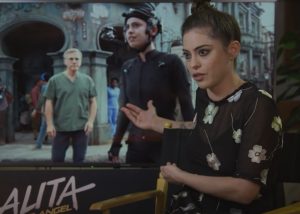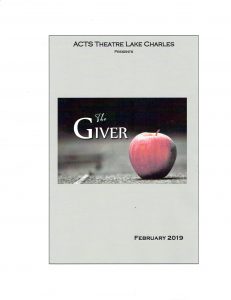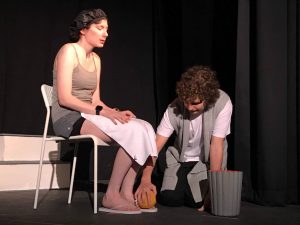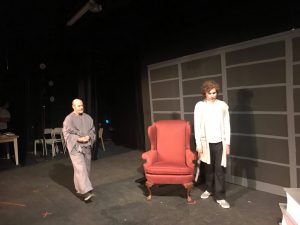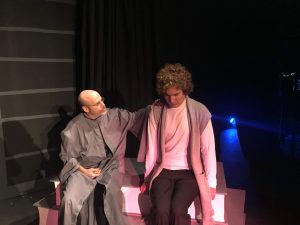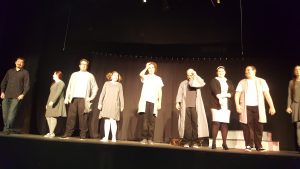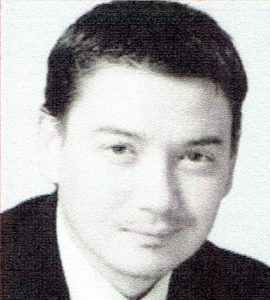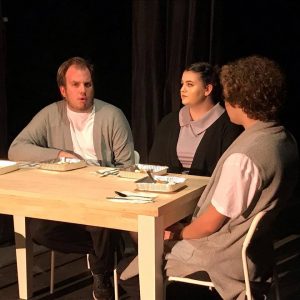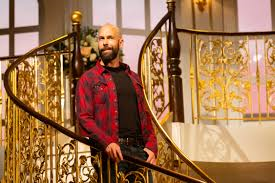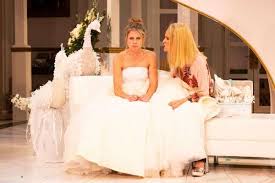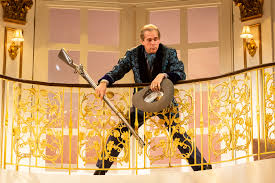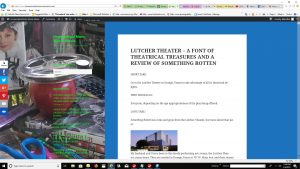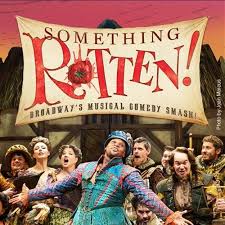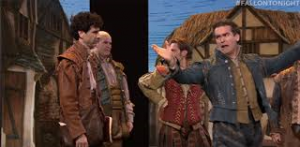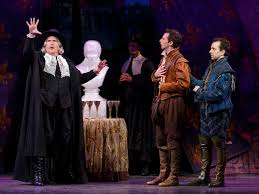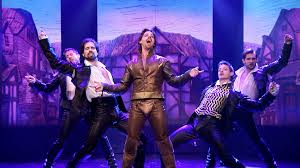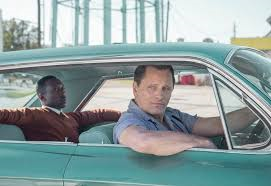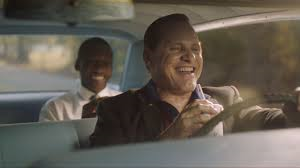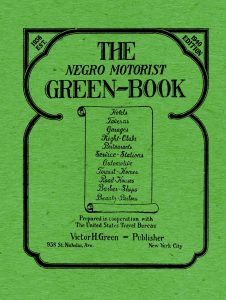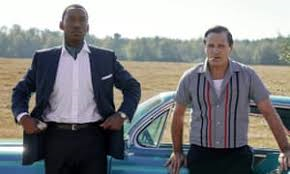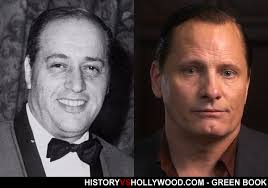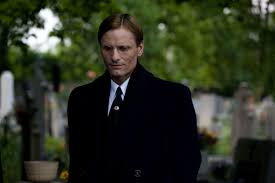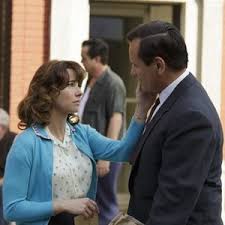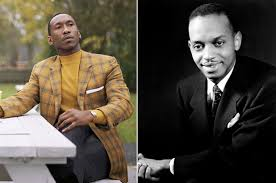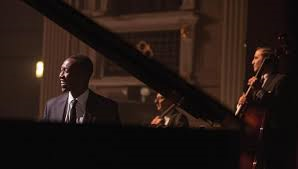AUDIO PODCAST OPTION OF ALITA: BATTLE ANGEL REVIEW
SHORT TAKE:
Fascinating animation/real action mix story based on a long-running Japanese manga series, about a cyborg girl reconstructed and “adopted” by a human and the dystopian society they both must navigate to survive.
WHO SHOULD GO:
Older teens/young adults minimum for language, and extreme violence.
LONG TAKE:
BEYOND HERE BE OCCASIONAL SPOILERS
This first heads up is more of a warning than a spoiler.  Alita: Battle Angel is nowhere near a completed story. James Cameron takes a page from Peter Jackson’s playbook – giving us great character introductions, wonderful interpersonal relationships, interesting and fearsome enemies, exciting battle scenes …. and an abrupt unfinished ending. OK – technically the titular director is Robert Rodriguez but with James Cameron as the scriptwriter you know many of the decisions in the filming of this movie were done as a collaborative effort.
Alita: Battle Angel is nowhere near a completed story. James Cameron takes a page from Peter Jackson’s playbook – giving us great character introductions, wonderful interpersonal relationships, interesting and fearsome enemies, exciting battle scenes …. and an abrupt unfinished ending. OK – technically the titular director is Robert Rodriguez but with James Cameron as the scriptwriter you know many of the decisions in the filming of this movie were done as a collaborative effort.
A musical analogy would liken it to ending a symphony on a dominant chord instead of the tonic chord, meaning a note that does not feel complete. Another way to look at it would be to begin the phrase ” shave and a haircut…”
Anyone who has seen the brilliant three-part Lord of the Rings series or the bloated Hobbit trilogy knows that Mr. Jackson likes to end his first story not exactly with a cliffhanger but with a temporary break in the action, taking Donald O’Conner’s advice to: “Always leave your audience wanting more,” to heart. Jackson ends his movies at about the place where one might choose to hit the pause button in the middle of the movie after one has had too many sodas.
And Mr. Cameron and Robert Rodriguez have done exactly the same thing with Alita – starting with an involving, well told story which then drops off a cliff. To be fair, this is on purpose.
HOWEVER, this is not surprising as Alita: Battle Angel is based, in whole and in part, on the first four of a NINE VOLUME 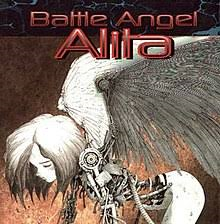 manga series written between 1990-1995 by Yukito Kishiro called Gunnm (translated literally as “Gun Dream”). Alita: Battle Angel, the movie, like the manga series before it, is about a cyborg girl rescued from a dumpster and reconstructed by a cybernetics physician in a dystopian society set about 500 years from now.
manga series written between 1990-1995 by Yukito Kishiro called Gunnm (translated literally as “Gun Dream”). Alita: Battle Angel, the movie, like the manga series before it, is about a cyborg girl rescued from a dumpster and reconstructed by a cybernetics physician in a dystopian society set about 500 years from now.
The CGI was astonishing. James Cameron, who has been enamored of this manga series for about 10 years, said that he was waiting for the technology to become advanced enough to meet the demands of how he saw the film should be made. And he does not disappoint.
 Rosa Salazar who plays the eponymous character is quoted to have said: “I’m a walking piece of technology, so that made it actually quite easy to fall into the physicality of a cyborg.” Photos of her show her dressed literally from head to foot in motion capture, including the unusual addition of two cameras on her face. Watching the behind-the-scenes was amusing as the actress would have to subtly duck and weave around the other actor’s head when coming close to avoid clobbering them with the extra headgear (which technology was, of course, CGIed out in post production). But the slight dance goes smoothly in the final product due to Ms. Salazar’s skillful body language and the technical prowess of the computer geniuses who brought Alita to life.
Rosa Salazar who plays the eponymous character is quoted to have said: “I’m a walking piece of technology, so that made it actually quite easy to fall into the physicality of a cyborg.” Photos of her show her dressed literally from head to foot in motion capture, including the unusual addition of two cameras on her face. Watching the behind-the-scenes was amusing as the actress would have to subtly duck and weave around the other actor’s head when coming close to avoid clobbering them with the extra headgear (which technology was, of course, CGIed out in post production). But the slight dance goes smoothly in the final product due to Ms. Salazar’s skillful body language and the technical prowess of the computer geniuses who brought Alita to life.
 It’s interesting to see Christoph Waltz as a good guy. Usually he plays very rough, sometimes cold blooded or downright evil characters – such as being the most recent incarnation of James Bond’s antagonist
It’s interesting to see Christoph Waltz as a good guy. Usually he plays very rough, sometimes cold blooded or downright evil characters – such as being the most recent incarnation of James Bond’s antagonist 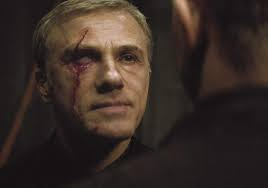 Blofeld in Spectre, or
Blofeld in Spectre, or  the chilling psycho-Nazi Landa in Inglourious Basterds (sic), or the abusive plagiarizing husband in Big Eyes – the list goes on. But in Alita, Waltz is a nurturing protective creator/father-figure,
the chilling psycho-Nazi Landa in Inglourious Basterds (sic), or the abusive plagiarizing husband in Big Eyes – the list goes on. But in Alita, Waltz is a nurturing protective creator/father-figure, 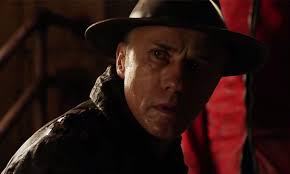 his normally scary edge giving believability to his “side job”.
his normally scary edge giving believability to his “side job”.
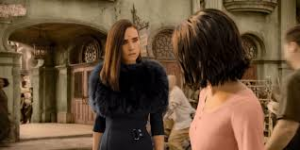 Jennifer Connelly, whose pedigree dates all the way back to David Bowie’s 1986 fantasy, Labyrinth, is Ido’s estranged wife and, therefore, Alita’s “mother”.
Jennifer Connelly, whose pedigree dates all the way back to David Bowie’s 1986 fantasy, Labyrinth, is Ido’s estranged wife and, therefore, Alita’s “mother”.
 Mahershala Ali (Green Book – see my post on that brilliant movie) is the lead baddie’s main henchman.
Mahershala Ali (Green Book – see my post on that brilliant movie) is the lead baddie’s main henchman.
 Keean Johnson does a delightful job of charming Alita as the shady boyfriend, Hugo, in a mixed motivational character with shifting alliances that Clark Gable might have played way back when. And I MUST note that Mr. Johnson is a HOMESCHOOLED KID!!! Check out his bio here on us.imdb.com.
Keean Johnson does a delightful job of charming Alita as the shady boyfriend, Hugo, in a mixed motivational character with shifting alliances that Clark Gable might have played way back when. And I MUST note that Mr. Johnson is a HOMESCHOOLED KID!!! Check out his bio here on us.imdb.com.
There are also some VERY fun cameos, which are designed for Mr. Cameron’s hoped for sequel. Jai Courtney  (Terminator Genisys – and don’t laugh at me, I REALLY LIKED that movie – see my post on it here) plays Jashugan, a champion in Motorball, the gladiatorial game played in Alita. Edward Norton
(Terminator Genisys – and don’t laugh at me, I REALLY LIKED that movie – see my post on it here) plays Jashugan, a champion in Motorball, the gladiatorial game played in Alita. Edward Norton  (he is to Hulk as Tobey Maguire was to Spiderman – close but no cigar, also in Collateral Beauty – see post here, Fight Club, and American History X), appears in a couple of – don’t blink or you’ll miss it – moments as Nova the ULTIMATE controller of the sky city of Zalem, who becomes Alita’s nemesis and the target of her future goals to storm said city. Both have uncredited parts. Mr. Cameron explained that even if they never make the sequel, that those characters were must-haves in the story and essential to show. And, he said, if they did make a sequel that they wanted heavy hitters for those roles. Both men, Courtney and Norton, are friends and work colleagues of Cameron’s, so were more than willing to participate even in these tiny roles to help further the prospect of a sequel.
(he is to Hulk as Tobey Maguire was to Spiderman – close but no cigar, also in Collateral Beauty – see post here, Fight Club, and American History X), appears in a couple of – don’t blink or you’ll miss it – moments as Nova the ULTIMATE controller of the sky city of Zalem, who becomes Alita’s nemesis and the target of her future goals to storm said city. Both have uncredited parts. Mr. Cameron explained that even if they never make the sequel, that those characters were must-haves in the story and essential to show. And, he said, if they did make a sequel that they wanted heavy hitters for those roles. Both men, Courtney and Norton, are friends and work colleagues of Cameron’s, so were more than willing to participate even in these tiny roles to help further the prospect of a sequel.
The soundtrack, written by Antonius B. Holkenborg, who goes by Junkie XL, is gorgeous and positively symphonic, creating a delightful variety of emotions from Alita’s sweetly, almost fairy-like awakening in Dr. Ido’s home to Terminator-feel violent reflections of her experiences in the Motorball battles against homicidal cyborgs during the Rollerball-level lethal game.
For anyone who is not old enough or geeky enough to remember the 1975 movie 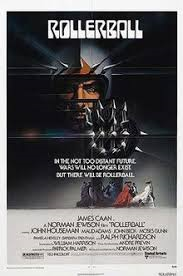 Rollerball, starring
Rollerball, starring 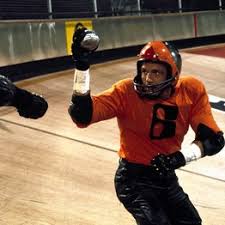 James Caan (whose credits date from the iconic tear-jerker sports game Brian’s Song, to the ill-fated Corleone son in The Godfather, to the voice of the tech-befuddled Dad in Cloudy with a Chance of Meatballs), it is worth taking note.
James Caan (whose credits date from the iconic tear-jerker sports game Brian’s Song, to the ill-fated Corleone son in The Godfather, to the voice of the tech-befuddled Dad in Cloudy with a Chance of Meatballs), it is worth taking note. 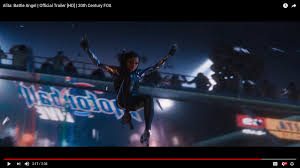 Motorball, as presented in Alita is a DUPLICATE of the murderous gladiatorial eponymous game played in the movie
Motorball, as presented in Alita is a DUPLICATE of the murderous gladiatorial eponymous game played in the movie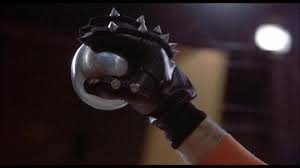 Rollerball,
Rollerball, 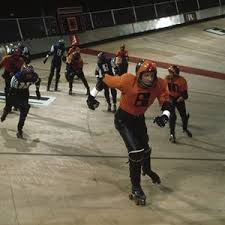
 set in another dystopian ultra-violent society. It is obvious Mr. Kishiro is familiar with this story.
set in another dystopian ultra-violent society. It is obvious Mr. Kishiro is familiar with this story.
There has been some controversy over the use of  oversized eyes in Alita. Some say they are disturbing and off-putting. I strongly disagree with the naysayers. Alita’s unusually large orbs perform a multiplicity of plot functions.
oversized eyes in Alita. Some say they are disturbing and off-putting. I strongly disagree with the naysayers. Alita’s unusually large orbs perform a multiplicity of plot functions.  For one, it highlights Alita AS a cyborg. There is no mistaking her for a natural born full human. For another, if windows are the eyes to the soul, then Alita wears hers not just on her sleeve right next to her heart but right there on her face for all the world to see. Between the fine acting and the quality CGI every subtlety of Alita’s growing and changing emotions and character are there for the audience to relate.
For one, it highlights Alita AS a cyborg. There is no mistaking her for a natural born full human. For another, if windows are the eyes to the soul, then Alita wears hers not just on her sleeve right next to her heart but right there on her face for all the world to see. Between the fine acting and the quality CGI every subtlety of Alita’s growing and changing emotions and character are there for the audience to relate.  Large, disproportionate eyes are also a feature of
Large, disproportionate eyes are also a feature of  small young creatures, including humans. It is one of the designations which mark an inchoate being, not just inspiring protective feelings of those around them but
small young creatures, including humans. It is one of the designations which mark an inchoate being, not just inspiring protective feelings of those around them but  signaling their fundamental innocence. While Alita does do some horrific things it is from her training in her previous life and only done for the protection of others – Ido, her human friend Hugo, even a stray dog.
signaling their fundamental innocence. While Alita does do some horrific things it is from her training in her previous life and only done for the protection of others – Ido, her human friend Hugo, even a stray dog.
Alita has a couple of obstacles to hurdle to gain the attention and affection of a Western audience. The first and most obvious is, of course, the manga origin, which is a subset of an already limited demographic of comic book sales.  The second is her identity as a warrior cyborg, which could have been an automatic bias against her given the Terminator series.
The second is her identity as a warrior cyborg, which could have been an automatic bias against her given the Terminator series.  I think her preternaturally large eyes help create an almost instant connection to this character, helping break down those barriers. I thought the device clever, without being (IF you will excuse the VERY deliberate pun) “in your face” and quite effective.
I think her preternaturally large eyes help create an almost instant connection to this character, helping break down those barriers. I thought the device clever, without being (IF you will excuse the VERY deliberate pun) “in your face” and quite effective.
While animated AND based on a comic book character, Alita is NOT for children.  There is EXTREME violence, which includes dismemberment, crushed heads, and death. It is likely the movie might have been saddled with an R rating had Cameron and Rodriguez not had the simple foresight to make cyborg “blood” obviously manufactured blue instead of gory red. There is at least one gratuitous “F” bomb uttered by Alita, herself. And they even violate one of MY personal taboos – they KILL A DOG! Though this happens, admittedly, out of sight,
There is EXTREME violence, which includes dismemberment, crushed heads, and death. It is likely the movie might have been saddled with an R rating had Cameron and Rodriguez not had the simple foresight to make cyborg “blood” obviously manufactured blue instead of gory red. There is at least one gratuitous “F” bomb uttered by Alita, herself. And they even violate one of MY personal taboos – they KILL A DOG! Though this happens, admittedly, out of sight,  Alita smears the dog’s red blood under her eyes like war paint before beginning her quest to defeat the tyrannical forces which have been unleashed against her and her ersatz family.
Alita smears the dog’s red blood under her eyes like war paint before beginning her quest to defeat the tyrannical forces which have been unleashed against her and her ersatz family.
As a result this is not a movie either for the young nor the faint of heart. For a more mature audience, however, it is a spectacular and creatively told outing. It is interesting to almost “feel” the Japanese manga origins in the way the characters react in more restrained, almost “Vulcan” ways than an America audience might be used to.
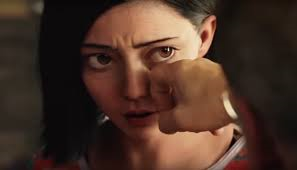 In addition, the plot moves along quickly and efficiently. It does not dawdle on relatively trivial points on which many similar genre American movies might languish. For example, there is a bit of tension created from Ido not telling Alita initially that the name he chose for her was that of his murdered daughter. (In the original manga series it was Ido’s cat, but Cameron’s script, wisely, I thought, decided on a more emotionally compelling attachment). Honestly, in an America movie this omission might have been held on to for a prolonged period then left as a mid-first act or even mid-second act “reveal”. Instead, Alita establishes this “secret” only long enough for the audience to find out, then has Ido explain it to Alita fairly expeditiously. To avoid spoilers I won’t give any more examples, but suffice to say this style is adapted throughout the movie. Such choices clear the way for a more intelligent plot.
In addition, the plot moves along quickly and efficiently. It does not dawdle on relatively trivial points on which many similar genre American movies might languish. For example, there is a bit of tension created from Ido not telling Alita initially that the name he chose for her was that of his murdered daughter. (In the original manga series it was Ido’s cat, but Cameron’s script, wisely, I thought, decided on a more emotionally compelling attachment). Honestly, in an America movie this omission might have been held on to for a prolonged period then left as a mid-first act or even mid-second act “reveal”. Instead, Alita establishes this “secret” only long enough for the audience to find out, then has Ido explain it to Alita fairly expeditiously. To avoid spoilers I won’t give any more examples, but suffice to say this style is adapted throughout the movie. Such choices clear the way for a more intelligent plot.
 I do recommend Alita but only for an older audience of late teens/young adults and up. It is refreshingly different and well written. It features excellent acting, especially considering the massive amounts of green screen in the landscape and motion capture equipment on the people with which the actors must contend. The music is worth listening to all by itself. But DO keep in mind the ending is VERY unsatisfying – albeit contrived purposefully so – as a build up for the next installment.
I do recommend Alita but only for an older audience of late teens/young adults and up. It is refreshingly different and well written. It features excellent acting, especially considering the massive amounts of green screen in the landscape and motion capture equipment on the people with which the actors must contend. The music is worth listening to all by itself. But DO keep in mind the ending is VERY unsatisfying – albeit contrived purposefully so – as a build up for the next installment.

